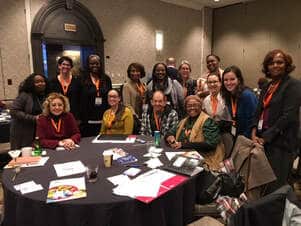
 Makai Kellogg is an anti-bias educator in the DC area. She teaches at School for Friends, serves as the Equity and Diversity Coordinator, and leads the Parents of Multiracial Children group. Find her website at: https://makaisecee.wordpress.com/
Makai Kellogg is an anti-bias educator in the DC area. She teaches at School for Friends, serves as the Equity and Diversity Coordinator, and leads the Parents of Multiracial Children group. Find her website at: https://makaisecee.wordpress.com/
From February 24-26 National Association for the Education of Young Children (NAEYC) members from across the country gathered for the NAEYC Public Policy Forum to advocate for young children, families and early educators. This was my first Public Policy Forum and I didn’t know what to expect. I was eager to learn and develop skills as an advocate. The schedule was packed as we listened to speakers, met within our state teams (or District, in my case), and learned about policies effecting the early childhood profession and its stakeholders. While the crowd represented a variety of experiences and levels of policy engagement, the ballroom at the Crystal Gateway Marriott did not represent much racial or gender diversity.
I had to familiarize myself with the many acronyms representing federal programs, agencies, and laws. I also learned which elected officials support specific policies focused on young children and education. Within the D.C. team, I met other DCAEYC members including current and former educators, consultants, and education policy experts.
We focused on NAEYC’s federal agenda looking specifically at the Child Care and Development Block Grant (CCDBG) which doubled in funding after last year’s policy forum. The goal is increased funding for CCDBG by $5 billion to broaden access to affordable, high quality child care. Another important issue is the reauthorization of the Higher Education Act to support current and future early childhood educators through loan forgiveness, support for students who are parents and accessibility to grants.
One of the most helpful sessions was led by Martha Coven who is the former Associate Director for Education, Income Maintenance, and Labor. She went over what we needed to know about the federal budget and appropriations such as the federal government fiscal year, the budget process and what happens when appropriations caps are raised or not.
Nina Perez from MomsRising gave examples of how to use storytelling when we concentrated on “Communication Strategies to Compel and Propel an Advocacy Agenda” and Emma Peterson (IWS) gave tips on using social media. I also attended a session titled “We are All Responsible: Advancing Equity and Equitable Systems for Children and Educators.” Syrithia Robinson from The Education Trust, shared research on the study of teachers of color perception of, barriers and supports to certification as well as that focus group’s thoughts on what leaders can do differently. There was also discussion on how states are/not supporting teachers with academic requirements, the whitening of the profession, funding not making it to classrooms, and overall equity in the workplace.
The two days of preparation and review of early education policy issues and advocacy strategies had us ready for Hill Day.
On Tuesday, Jackie Hines, early educator and treasurer for the Washington Teacher’s Union, and I walked down to the Rayburn House Office Building to find Congresswoman Eleanor Holmes Norton‘s office. We met with her Chief Counsel and Legislative Director, Bradley Truding. (Norton was busy fighting for D.C. statehood!) We explained the purpose of the public policy forum and why early educators were on the Hill. Congresswoman Norton is a non-voting delegate but she continues to be a powerful voice in the House and has always been supportive of progressive education policy. We took the time to ask each other questions about education issues locally and nationally, for example, he asked us our positions on the D.C. requirements for teacher credentials and education. Truding shared examples of Representative Norton’s work in education such as:
- sponsoring universal pre-k (based on D.C.’s model)
- introducing a bill to create a national grant program to educate school staff on implicit bias
- being an original co-sponsor of the Child Care for Working Families Act
- opposition to the D.C. voucher program that sends low income D.C. students to private schools instead of providing funding for public and charter schools
We informed him about D.C.’s Month of the Young Child (an extension of the Week of the Young Child) and invited Representative Norton to visit early programs in D.C. during that time. Truding was very engaged and helpful and we had a great experience. Jackie and I left a sheet of DC related early education resources as well as a thank you for her continued support for early education efforts including the child care bear.
An added bonus: the Child Care for Working Families Act was reintroduced today!
By encouraging our representatives to pass laws that increase funding as well as enact policies that acknowledge and support the needs of children, families and early educators, hopefully changes to the system will consequently create visible change in our classrooms and communities.
If you are interested in early childhood advocacy, consider reaching out to your state team leader for the 2020 Public Policy Forum or click here.
